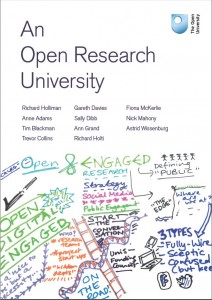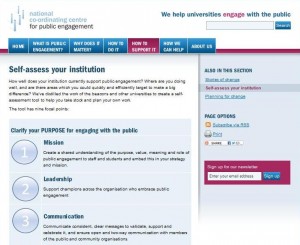
Professor Tim Blackman
The Open University’s Public Engagement with Research Catalyst, ‘An open research university‘, was one of eight funded by RCUK under this scheme.
Led by Professor Tim Blackman, who is now the Vice-Chancellor at Middlesex University, and supported by a multi-disciplinary research team, this three-year project (April 2012 – March 2015) embedded engaged research within The Open University’s strategic planning for research and the operational practices of researchers at all levels.
To download a copy of the final report from this project, select: Holliman, et al. 2015
We were delighted to become a signatory to the NCCPE’s Manifesto for Public Engagement. Engagement has always been an integral part of our open learning mission, putting students at the heart of everything we value. Becoming a signatory to the NCCPE Manifesto gave us an opportunity to restate this commitment, exploring how these principles could become embedded within our research culture, incorporating the perspectives of stakeholders, user communities and members of the public.
We remain committed to creating the conditions where engaged research can flourish and where excellence in research engagement is recognised and valued. In embedding the principles, values and reflective practices of engaged research within The Open University, we want to ensure that our research has relevance in wider society, embracing an ‘ecology of openness’ as we celebrate success as an open research university.
Peter Horrocks
Vice-Chancellor, The Open University
Over the three-year life of the project, The Open University developed a more strategic approach to engaged research that was both informed by, whilst also informing, theoretical and practical work conducted by academic researchers, and by sector-wide strategic developments in relation to engaged research.
Aims and objectives
Through the PER Catalyst programme of organisational change, we:
- explored the roles and responsibilities that different academic domains value in providing leadership for public engagement with research
- supported discussions to develop a shared understanding of engaged research as it applies in different research domains
- changed our promotion criteria, introducing Knowledge Exchange profiles, and implemented an awards scheme, recognising researchers for excellence in engaging stakeholders, user communities and publics with research
- investigated the requirements and support mechanisms that can facilitate effective digital engagement with research
- explored how researchers plan, enact and evaluate their engaged research, creating engaged communities of reflective practice
- built on existing work in career development and doctoral training programmes for researchers and postgraduate research students
- issued calls to researchers for seed funded projects on engaged research, providing a network of support
- offered structured opportunities for publics, students, user communities and other stakeholders, e.g. through Participation Now and , to engage with OU researchers and research
Framing culture change
A technique known as the ‘EDGE Tool‘ provided the co-ordinating framework for the project. (EDGE is an acronym that stands for Embryonic, Developing, Gripping and Embedding.)
Developed by the National Co-ordinating Centre for Public Engagement, the OU project team used the EDGE Tool to assess the university’s support for engaged research in relation to nine categories: leadership; mission; communication; support; learning; recognition; staff; students; and publics.
Each of the OU Catalyst project’s objectives related to a category from this tool and had a work package associated with it. The work packages were evaluated in March 2015 according to the criteria laid out in the tool.
Research with people at the centre
Our overarching aim was to transform The Open University’s research culture from a ‘developing’ phase, following the assessment in November 2011, to a ‘gripping’ or ‘embedding’ phase by March 2015.
We made progress in all nine of the work packages; in two of them we went beyond our planned targets, consolidating the Open University’s international reputation for excellence in engaged research.



